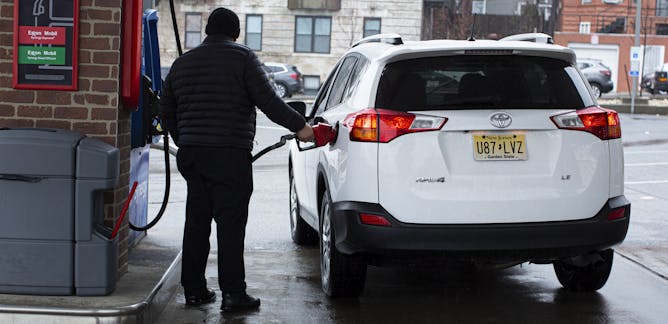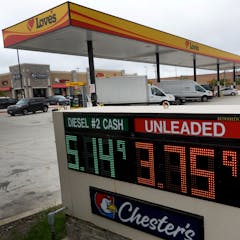
Articles on Gasoline
Displaying 1 - 20 of 22 articles

The Garden State is the only one in the country that forbids self-service gas stations − and that’s not likely to change anytime soon.

Inflation remained near a 40-year high due to a jump in the cost of food and shelter. But that might not mean the Federal Reserve will get more aggressive when it comes to monetary policy.

We asked four experts to explain what gas taxes are used for and whether waiving them will make much of a difference to American households.

Consumers are feeling pain at the pump and demanding solutions. Some politicians are pushing gasoline tax waivers – but that means less money to fix roads, and often not much economic relief.

Oil revenues are crucial to Russia’s economy. The US only accounts for a small fraction of them, so banning Russian oil imports has mainly symbolic value.

Oil supply is very tight, and the current geopolitical crisis involving Russia, one of the world’s largest oil producers, has pushed prices over the edge.

Burning leaded gasoline releases toxic lead into the environment, and for 100 years people around the world have been dealing with the health effects. How did a century of toxic fuel come to be?

Proposals for new oil and gas pipelines can generate intense debate today, but during World War II the US built an oil pipeline more than 1,300 miles long in less than a year.

Ford’s electric F-150 pickup won’t roll off assembly lines until early 2022, but the company has received thousands of preorders already for a vehicle aimed at the mass market, not eco-buyers.

Electric cars offer benefits for low-income and minority drivers, including cleaner air and lower maintenance costs. But it will take more than rebates on new models to make EVs accessible for all.

There’s no question Tesla’s Cybertruck will face stiff competition in the electric pickup truck market. Here’s why it has the edge.

Vehicles in Canada are big, heavy and guzzle a lot of gasoline.

The world’s most oil-abundant nation is heading for energy consumption levels not seen since the 1990s.

Vehicles made before 2001 could suffer fuel system or engine damage if they’re run on E15.

There’s no precedent for selling oil from the Strategic Petroleum Reserve at a time when there’s no market-driven reason for doing that.

The Trump administration’s move to freeze fuel economy standards reflects a sea change in American energy policy first born during an era of oil shortages and environmental crises.

Diesel engines have been demonised for their emissions but the technology has already cleaned up its act.

Many people thought U.S. gasoline consumption had already peaked. They were wrong. What happened?

Faced with stringent fuel economy standards but cheap gas, automakers may seek to delay CAFE rules. What’s the best way to reevaluate these emissions-cutting rules?

American consumers just aren’t prioritizing fuel efficiency in a time of low gasoline prices. Is there a way to reverse the trend and make progress on climate change?
